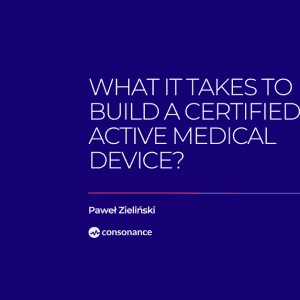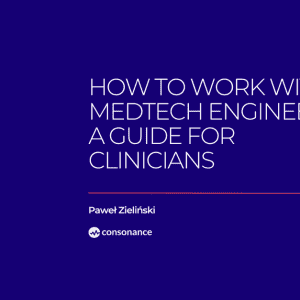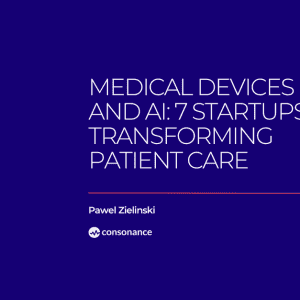Digital Transformation and Data. How Data Science and Artificial Intelligence are changing the healthcare industry

Would Data Science be useful in your business? Could artificial intelligence bring you real value? How do these two concepts relate to the needs of the medical and pharmaceutical sectors? This article outlines areas where the broader medical market is benefiting from new Data Science and AI capabilities. We also present data science solutions developed by Consonance for clients in the medical industry.
Artificial intelligence is very trendy today. So trendy that it sometimes seems like something that should be included in almost every digital project. However, while “everyone is going into AI,” you may be wondering how current trends are relevant to your company’s needs. These are questions worth asking yourself. They demonstrate an informed approach to your own projects. There’s probably no exaggeration in the saying that “data is the oil of the 21st century.” And one could even say that today data is more than oil. It’s easy to point to products that don’t need oil from concept to market. Conversely, can we imagine any product development without data?

 In addition to the obvious time savings, the example of this technology shows how Data Science can realistically support Business Intelligence. The cooperation of Cardiomatics with Pfizer in Germany is proof of this. Why would a big pharmaceutical company be interested in such technology? Well, by automating the process of signal assessment, ECG analysis can go beyond cardiologists’ offices and reach general practitioners as well. And now for two figures: behind our western border, there are three thousand cardiologists and over sixty thousand so-called “general practitioners”. In other words, a much larger market opens up for Pfizer thanks to such technology.
In addition to the obvious time savings, the example of this technology shows how Data Science can realistically support Business Intelligence. The cooperation of Cardiomatics with Pfizer in Germany is proof of this. Why would a big pharmaceutical company be interested in such technology? Well, by automating the process of signal assessment, ECG analysis can go beyond cardiologists’ offices and reach general practitioners as well. And now for two figures: behind our western border, there are three thousand cardiologists and over sixty thousand so-called “general practitioners”. In other words, a much larger market opens up for Pfizer thanks to such technology.

Table of Contents
What is Data Science?
In the simplest terms, the concept of Data Science refers to the analysis of data about the product, company, customers, audience behavior and any other data collected during the project. The key issue is the relationship of this analysis with the so-called Business Intelligence. Gathering data for the sake of gathering it is rarely enough – what is important is the transformation of data into information, and information into valuable knowledge. And this is what data analysts do every day. With data, you have knowledge. You just need to know how to find it. Realistically building on data analytics means using data to grow your business. The relationship between Data Science and Business Intelligence is therefore close. Data should support a variety of processes related to unlocking new opportunities, better understanding customers and their needs, and making better decisions based on past ones. The relationship between Data Science and Business Intelligence can be considered traditionally strong in the healthcare industry. After all, data underpins the organization of the healthcare system as well as the production of medicines. However, factors such as the tremendous technological advancements of the past decades, as well as the progressive digitization of healthcare, have made this relationship to be considered stronger than ever today. In speeches during training, Data Science or AI can sometimes sound like so-called buzzwords, but it’s important to recognize that it didn’t come from nothing. According to McKinsey, in the U.S. alone, skillful use of data could translate into savings for the entire sector of, bagatelle, $300 to $450 billion. Errors and omissions resulting from bad data cost the U.S. healthcare industry alone an estimated $3.1 trillion (!) annually. In a sense, how important it is to use data well becomes apparent when we don’t collect data or when we collect it poorly. So if you’re asking yourself if you need Data Science in the company you work for or if artificial intelligence algorithms could support certain processes, you might as well start asking questions of a slightly different type. Consider, for example, whether you have databases from which you are not extracting any interesting information. Or whether your company has ever released a product to the market, only to ultimately learn nothing about how customers use it. Or if your employees could spend less time on certain activities in Excel.
Applying Data Science in the Healthcare and Pharmaceutical Industry
The application areas of Data Science in the healthcare industry are very diverse. Analyzing data about patients and their behavior is, of course, the basis of any market research and marketing in the healthcare industry. Natural language processing and document corpus search, on the other hand, is often used by pharmaceutical companies and contract research organizations (CROs) for all kinds of textual analysis. A special role is played here by searching for texts with the desired content, classification according to specific criteria or extraction of search phrases. For companies in the healthcare industry with a manufacturing component, algorithms are used to automate and optimize manufacturing processes using machine learning techniques. Data analysis is also used for anomaly detection and failure prediction.AI oraz Data Science in the medical diagnostics
In this era of digital transformation, Data Science supports diagnostic processes especially in those areas of healthcare that face systemic problems. An example of such an area is ophthalmology. In the world’s most populous countries, it has become a great challenge to provide diagnosis of diseases of the visual system to a huge number of people with insufficient staff and resources. Any system savings, such as taking over part of the diagnosis by automated systems and artificial intelligence, makes a big difference here, as it contributes to more people receiving treatment. In India, a country that today can be considered a flagship example of ophthalmology and diabetes challenges, Google and Verily have launched a program to rapidly diagnose glaucoma using artificial intelligence. The Data Science-based technology today identifies retinopathy, diabetes and macular edema, and interprets the results. The FDA-approved IDx-Dr. solution is used for a similar purpose, and the process takes less than a minute. A specialist is virtually no longer needed for this part of the diagnosis. The use of data analytics and AI capabilities to bring more patients into treatment can also be seen in the Cardiomatics solution. This is an automated ECG analysis tool that uses an artificial intelligence and deep learning algorithm. It significantly speeds up the work of physicians who struggle with the analysis of long-term ECG recordings (24h or more). The system operates in the cloud, which guarantees the availability of the service. The solution is used by clients from Switzerland, Germany and Denmark, among others. Cardiomatics is a certified class IIa medical device. In addition to the obvious time savings, the example of this technology shows how Data Science can realistically support Business Intelligence. The cooperation of Cardiomatics with Pfizer in Germany is proof of this. Why would a big pharmaceutical company be interested in such technology? Well, by automating the process of signal assessment, ECG analysis can go beyond cardiologists’ offices and reach general practitioners as well. And now for two figures: behind our western border, there are three thousand cardiologists and over sixty thousand so-called “general practitioners”. In other words, a much larger market opens up for Pfizer thanks to such technology.
In addition to the obvious time savings, the example of this technology shows how Data Science can realistically support Business Intelligence. The cooperation of Cardiomatics with Pfizer in Germany is proof of this. Why would a big pharmaceutical company be interested in such technology? Well, by automating the process of signal assessment, ECG analysis can go beyond cardiologists’ offices and reach general practitioners as well. And now for two figures: behind our western border, there are three thousand cardiologists and over sixty thousand so-called “general practitioners”. In other words, a much larger market opens up for Pfizer thanks to such technology.
Using artificial intelligence to predict patient behavior
Prediction is also an important area of application of Data Science and AI in healthcare. Based on the examples mentioned earlier, collecting data about patients and their behavior is an extremely important branch of data analytics. However, the possibilities don’t end there, as one could predict the likelihood of certain events in the future based on this. For some products, prediction is the basis for creating competitive advantage. Take, for example, Medtronic’s Guardian Connect diabetes product. The main component in the kit is a continuous glucose monitoring device, supported by a data collection application. If limited to just that, the product would be remarkably similar to hundreds of others on the market, and the value proposition, while defined and specific, would not stand out. However, in this particular case, the software based on Data Science provides very interesting functionality. Guardian Connect can predict when blood glucose will approach a critical value, hours in advance. This is an important support for the diabetic, in whose life self-observation is essential. The great potential of artificial intelligence for prediction purposes also becomes apparent in the area of mental health. Here, too, we have large and important systemic challenges, although of a somewhat different nature than in ophthalmology. First of all, many patients do not start treatment early enough. Among the reasons for not starting treatment is the traditional perception that mental illnesses and disorders and addictions are shameful. Modern technologies help address these challenges. What’s more, chatbots can be a viable source of pre-screening.






